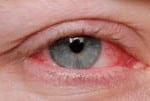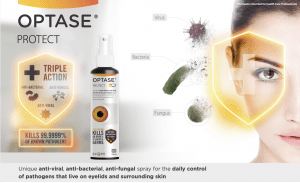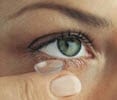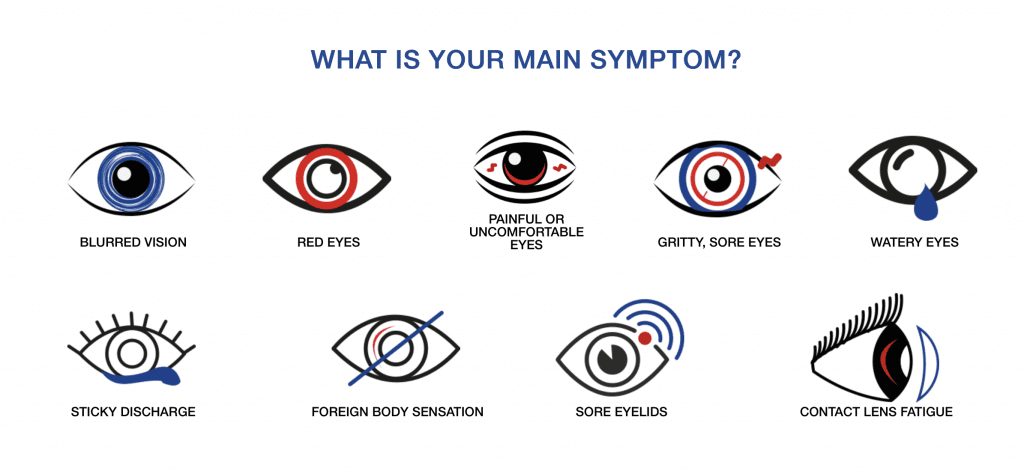
06 May Hay Fever and Eye Allergies
Hay Fever and Eye Allergies
For many seasonal allergy sufferers, pollen is the most common eye irritant. The patient potentially may suffer from allergic conjunctivitis, an inflammation of the conjunctiva, the membrane on the back of the eyelids and front of the eyeball. Eye allergy susceptibility has often a hereditary element (immunoglobulin), and often occurs due to processes associated with other types of allergic responses.
Allergy Symptoms and Signs
 Common signs of allergies include:
Common signs of allergies include:
-Itchy, red eyes and swollen eyelids
-Runny nose
-Sneezing and coughing
-Itchy nose, mouth or throat
-Headache from sinus congestion
Beyond more obvious symptoms, you also may feel fatigued and could suffer from lack of sleep.
Sufferers may be especially miserable in spring and early summer as grass pollen season kicks into high gear in much of the country. Grass pollen is especially irritating to the eyes. So are ragweed pollen, which will begin spreading later in the summer.
Even though people blink an average of 15,000 times a day, pollen still gets in their eyes, and reside on their eyelids and surrounding skin.
Here are several steps that people can take to reduce pollen’s irritating effect on their eyes:
Wash your hands:
During high allergy season, pollen is everywhere. You get it on your hands, opening a car door, running your hands through your hair or touching other outdoor surfaces. If you rub your eyes with those pollen-coated hands, they will only get more irritated. Washing your hands frequently can reduce the amount of pollen that gets in your eyes. We know from the COVID pandemic what hand hygiene means for spreading the cold and flue virus.
Use saline rinses or artificial tears:
These can provide significant relief by removing or diluting the pollen grains in the eye. Some people actually are allergic to the preservatives in eye drops such as those used to lubricate dry eyes. In this case, you may need to use a preservative-free brand and single unit dose eye drops (minims). A new innovative product from Scope is Optase Protect a spray that acts as an anti-microbial, anti-viral and anti-fungal.
Wear sunglasses:
Sunglasses can reduce the amount of pollen that gets in the eyes by deflecting the wind carrying it toward you. Make sure you wear wraparound sunglasses to help shield your eyes from allergens, and drive with your windows closed during allergy season. Face masks which we have all become accustomed to wearing will equally reduce our expose to these air Bourne particles.
Close the windows:
This can reduce pollen floating in the air both in the house and in the car. Trying to escape the summer heat by sleeping with open windows and a fan might provide temporary relief from heat, but it can cause allergy sufferers to have stuffy noses, itchy eyes and sneezing throughout the night.
Pollination may occur at all hours of the day or night, so people with hay fever and other allergies should close their homes and use an air conditioner to filter allergens. Using a fan to keep cool may actually add to the problem by keeping allergens suspended and circulating through the air. If windows need to be open, an oral antihistamine or decongestant can be taken-but only under the advice of a physician.
Apply cold compresses:
A bag of frozen peas or a moist washcloth that has been placed briefly in the freezer can reduce itching when put over the eyes.
Use medications:
Several medications can also help people whose eyes bear the brunt of their seasonal allergies. For people with mild symptoms, oral antihistamines can prevent irritation of both the eye and the nose. For those with more severe allergic conjunctivitis, physicians can prescribe a number of medications that can be applied directly to the eye. These include topical antihistamines, vaso-constrictors, mast-cell stabilizers, topical non-steroidal anti-inflammatory medications, or topical corticosteroid (which are usually prescribed by ophthalmologists).
From your pharmacist Otrivin Antistin eye drops are an effective treatment from the symptoms. Patients should consult their own physicians to learn what would work best for them. Patients should also remember to take some of these medications continually throughout the pollen season rather than intermittently because most of them work best if taken before the allergen exposure, rather than after the eyes have already become irritated.
Decongestants clear up redness.
They contain vaso-constrictors, which make the blood vessels in your eyes constrict, lessening the apparent redness. They treat the symptom of red eye but not the cause of eye allergies.
Antihistamines, decongestants and mast cell stabilizers are available in pill form, but pills don’t work as quickly as eye drops or gels, to bring much needed eye relief.
Non-steroidal anti-inflammatory drug (NSAID) eye drops may be prescribed to decrease swelling, inflammation and other symptoms associated with seasonal allergic conjunctivitis, also called hay fever. These would not be a first line treatment but reserved to deal with acute inflammation rather than the allergy itself.
Check the product label or insert for a list of side effects of over-the-counter medications. For prescription medication, ask your doctor.
In some cases, combinations of medications may be used.
Eye Allergies and Contact Lenses
Even if you are generally a successful contact lens wearer, allergy season can make your contacts uncomfortable. Airborne allergens can get on your lenses, causing discomfort.
Allergens also can stimulate the excessive production of natural protein substances in your tears, which can bind to your contacts and cause blur and additional discomfort.
Pollen maps can help you determine when allergens are present. You can check out pollen information for Ireland on https://www.met.ie/forecasts/pollen
Ask your eye optometrist about eye drops that can help relieve your symptoms and keep your contact lenses clean. Certain drops can discolor or damage certain lenses, so it makes sense to ask first before trying out a new brand.
Another alternative is switching to daily disposable contact lenses if you are not already using them, these lenses are discarded nightly. Because you replace them so frequently, these types of lenses are unlikely to develop irritating deposits that can build up over time and cause or heighten allergy-related discomfort.
EYE ALLERGIES SELF-TEST
Do allergies run in your family?
Do your eyes often itch, particularly during spring pollen season?
Have you ever been diagnosed with “pink eye” (conjunctivitis)?
Are you allergic to certain animals, such as cats?
Do you often need antihistamines and/or decongestants to control sneezing, coughing and congestion?
When pollen is in the air, are your eyes less red and itchy when you stay indoors under an air conditioner?
Do your eyes begin tearing when you wear certain cosmetics or lotions, or when you’re around certain strong perfumes?
If you answered “yes” to most of these questions, then you may have eye allergies. Make an appointment with an optometrist or ophthalmologist to determine the best course of action.
Email an questions you may have to info@opticalrooms.com


